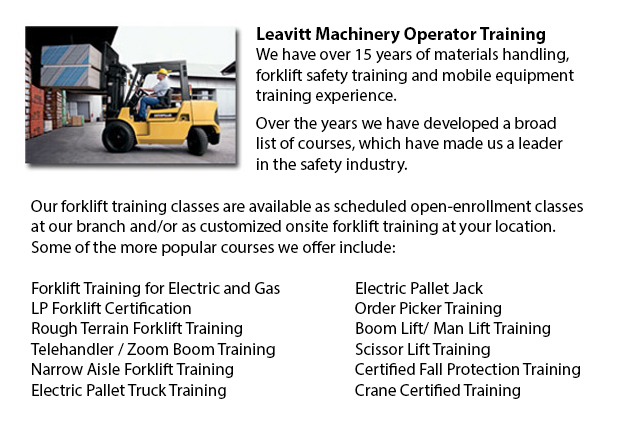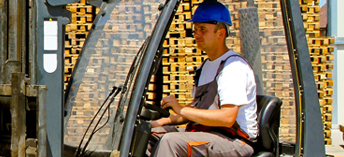
Rough Terrain Forklifts Training Kingston - There are in fact two distinctive categories of forklifts within the material handling industry, the industrial model and the rough terrain model. Rough terrain forklifts first arrived on the marketplace in the 1940's and had been primarily used on uneven surfaces, ideal for areas where no paved roads were existing, like building sites and lumberyards.
Rough terrain forklifts normally utilize an internal combustion engine with a battery for power. The engines can operate on propane, diesel or gas. Some makers are experimenting with rough land forklifts that utilize vegetable matter and run from ethanol. Large pneumatic tires with deep treads characterize these forklifts to permit them to latch onto the roughest soil type devoid of any slippage or sliding.
A few of the original versions of rough terrain lift trucks had the capability to haul in excess of 1000 lbs, by means of forks that could run beneath the item, haul it slightly and move it to an alternate location. After ten years on the market, rough terrain lift trucks were enhanced with supplementary carrying power, increasing the possible weight to more than 2000 lbs. Telescoping booms were added in the 1960's, permitting them to stack resources much higher than in preceding years. The telescoping model feature is a staple of most rough terrain forklifts nowadays. Present models are capable of managing well over 4000 lbs due to the continuous improvements over time. Telescoping ability has also improved with some styles achieving a height of 35 feet. Worker safety has also become a focus with a lot of all terrain lift trucks now built are equipped with an enclosed cab for the driver, as opposed to the older open air seating capacity.
The all terrain lift trucks on the market today both perform well on unpaved surfaces and paved floors. This kind of all terrain lift truck is marketed for its' versatility allowing the possibility for organizations to use one unit to transfer resources from an outside working area into a warehouse.
-
Crown Forklift
More -
Boom Lifts
Boom Lifts Training Kingston - Boom lifts are machinery that has a platform that may be lowered or lifted to different heights, therefore making this piece of machinery an important necessity in a wide variety of professions. Available in several spe... More -
Pallet Lifts
Pallet Lifts Training Kingston - A pallet haul is a device designed principally for moving pallets of differing weights and sizes. They might be used in conjunction with cranes, platform lifts and other heavy duty machinery as an accessory piece or t... More -
Scissor Lifts
Scissor Lift Training Kingston - The scissor lift or table lift, is a mechanized industrial lift that has been modified to be utilized in retail, wholesale, manufacturing and production environments. Industrial scissor lifts have been used chiefly wi... More -
Komatsu Forklift
Komatsu Forklift Training Kingston - Komatsu Forklift U.S.A. Inc. has an excellent reputation for building dependable and robust lift trucks. Komatsu is renowned around the globe as a business with a rich heritage while retaining an admirable standar... More

Forklift Certification Kingston
TOLL FREE: 1-888-254-6157
Kingston, Ontario
forkliftcertificationkingston.com
Email Us
About Us


